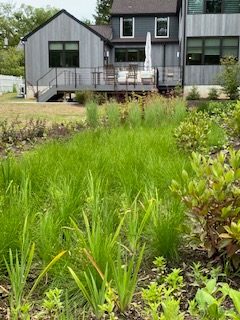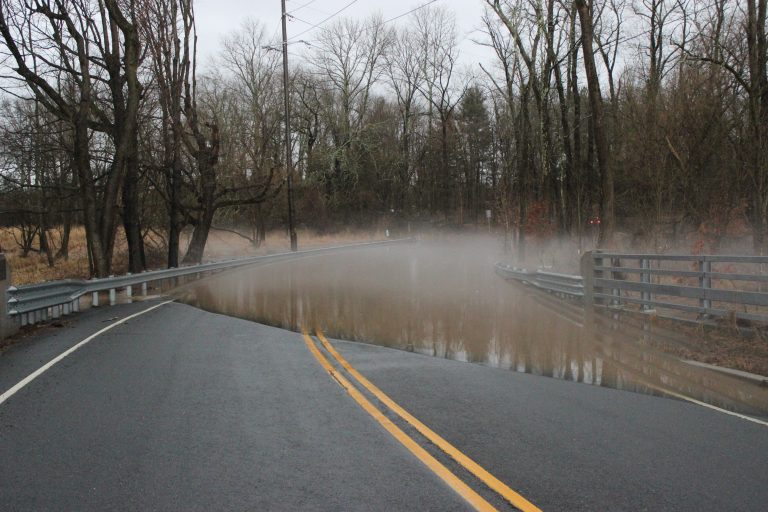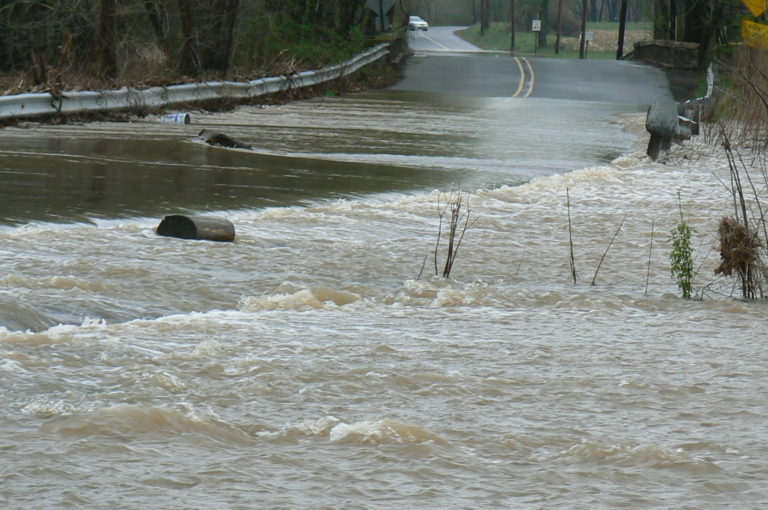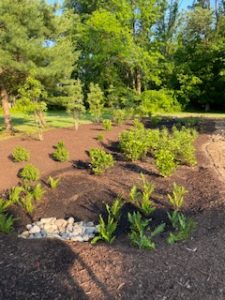 Rain gardens are starting to become a more common sight in Princeton! As one type of green infrastructure, rain gardens use plants and soil to capture and clean the polluted stormwater runoff that can cause flooding. Polluted stormwater runoff is the primary source of water pollution in New Jersey.
Rain gardens are starting to become a more common sight in Princeton! As one type of green infrastructure, rain gardens use plants and soil to capture and clean the polluted stormwater runoff that can cause flooding. Polluted stormwater runoff is the primary source of water pollution in New Jersey.
Like many communities in New Jersey, Princeton faces significant flooding issues that are getting worse because of intensifying rain events, the loss of tree canopy, and continued development. In 2020, Princeton adopted a stormwater management ordinance (local law) that requires that any new development, including single-family residences that adds 400-square-feet or more of new impervious surface to manage the stormwater runoff using green infrastructure. The new requirement went into effect in March of 2021
After one year the results are in: 24 rain gardens have been approved for single-family residential projects. Once they are functional, these rain gardens will use plants and soil to treat 115,000 gallons of runoff for water quality and retain about 45,000 gallons, allowing them to infiltrate rather than contribute to flooding. Rain gardens also predominantly use native plants, which support birds, pollinators, and other native species.
Learning how to integrate green infrastructure into the residential design process is a new thing for many architects, engineers and landscape architects. Princeton’s Assistant Municipal Engineer, Jim Purcell, has worked hard this year to educate all of these stakeholders on this new policy. In his words, “Rain gardens are not difficult to construct and are easy to maintain – think of them as creative landscaping. With the right grading, soil mix, and plants, you’ll have a beautiful addition to your yard that enhances the environment and protects your downstream neighbors.”
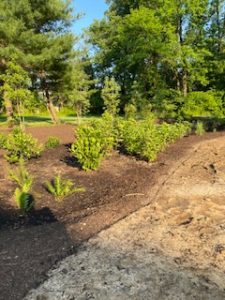 Britney O’Donnell Garden Design created a rain garden and wildflower meadow to comply with the new stormwater management requirements for one Princeton property. In addition, new native trees including Black Tulip (Nyssa sylvatic) and native dogwood (Cronus Florida) were added to replace Ash trees that had to be removed. Britney is one of the local landscape professionals who has completed The Watershed Institute’s Green Infrastructure certification program (WIGI) designed to provide landscape professionals, engineers and architects with the expertise needed to design, install and maintain green infrastructure. The next session will take place over three days, October 11, 18 and 21. Registration and more information will be available soon.
Britney O’Donnell Garden Design created a rain garden and wildflower meadow to comply with the new stormwater management requirements for one Princeton property. In addition, new native trees including Black Tulip (Nyssa sylvatic) and native dogwood (Cronus Florida) were added to replace Ash trees that had to be removed. Britney is one of the local landscape professionals who has completed The Watershed Institute’s Green Infrastructure certification program (WIGI) designed to provide landscape professionals, engineers and architects with the expertise needed to design, install and maintain green infrastructure. The next session will take place over three days, October 11, 18 and 21. Registration and more information will be available soon.
We can all play a role in using green infrastructure to address flooding. Here are some ways that you can help:
● Learn more about Princeton’s stormwater management requirements by watching this recent webinar featuring Assistant Municipal Engineer Jim Purcell hosted by Sustainable Princeton. A follow-up webinar in the same series by Americorps Watershed Ambassador Marisa Immordino focuses on what residents can do in their backyards.
● Visit our Watershed Center to see our rain gardens, green roof, cistern, porous pavement, and constructed wetland.
● View the Exploring Green Infrastructure section of The Watershed Institute’s website to view examples of green infrastructure that has been installed in Princeton and surrounding towns and to learn more about green infrastructure and how you can integrate it into your property.
● If you are planning to build a home or to add impervious surfaces as part of a renovation, ask your architect, engineer, and landscape architect how green infrastructure can best be incorporated into your plans
● Protect your trees and plant new ones. Visit the tree benefits calculator to learn how many gallons of stormwater per year your trees absorb.
● If you are a landscaper, landscape architect, architect, engineer, or a community member interested in creating your own green infrastructure, enroll in The Watershed Institute’s Green Infrastructure certification program, WIGI.
Princeton is one of several towns that adopted stronger protections for their community since the New Jersey Department of Environmental Protection adopted the Green Infrastructure stormwater rules. The Watershed Institute continues to advocate for other municipalities to follow Princeton’s lead in requiring stormwater management with green infrastructure for single-family homes. We thank Princeton’s Mayor, Council, Flood and Stormwater Commission, and especially the members of the Engineering Department for their leadership on this important issue.

